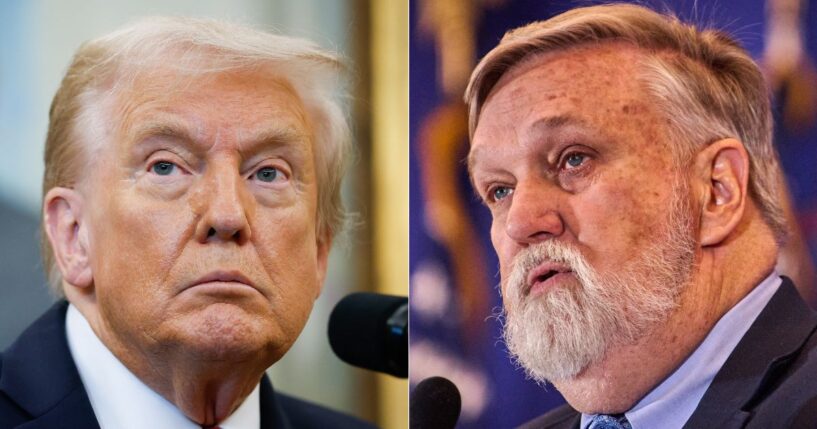President Donald Trump’s recent comments regarding his own place in the afterlife have ignited reactions among Christian leaders and commentators, highlighting once again the intersection of faith and public discourse in American politics.
The remarks came during a conversation aboard Air Force One, when Fox News correspondent Peter Doocy asked the former president about his spiritual standing in the context of recent international developments. “You talked about how you hoped to end the war in Ukraine because it might help you get into heaven. How does this help?” Doocy asked.
In response, Trump offered an answer that combined his characteristic irreverence with a surprisingly candid reflection on mortality and the afterlife. “I don’t think there’s anything gonna get me in heaven. I think I’m not maybe heaven bound. I may be in heaven right now as we fly in Air Force One. I’m not sure I’m gonna be able to make heaven,” he said.
The statement, typical of Trump’s unfiltered communication style, nonetheless touched on a subject that resonates deeply in American Christian discourse—the hope of salvation and the moral reflection that accompanies it.
In the wake of these remarks, Pastor Douglas Wilson has issued a response, sharing both a video message and an open letter addressed to the former president. In his message, Wilson affirms the importance of contemplating eternal matters, emphasizing that Trump’s engagement with questions of heaven is a positive sign. The pastor’s intervention adds a layer of spiritual and theological commentary to a conversation that, until now, had been dominated by political and personal rhetoric.
Wilson’s letter underscores the broader dialogue within Christian communities about morality, accountability, and the afterlife, placing Trump’s remarks in a wider cultural and religious context. By addressing the president directly, Wilson seeks not only to comment on a public figure’s spiritual musings but also to engage a national audience in reflection on faith, ethics, and the human aspiration for redemption.
Dear Mr. President,
Greetings in the Lord. Thank you for your service to our country.
As I have noted the various comments you have made about Heaven, I have felt burdened to write to you. I decided on an open letter and there are two reasons I can give for this.
In the first… https://t.co/Ok2NVxcYUh pic.twitter.com/9OaSV4JPaf
— Douglas Wilson (@douglaswils) October 15, 2025
In his open letter, Pastor Douglas Wilson wrote directly to President Trump, framing his message through the lens of his ministry. “I write because I am a minister of the kingdom of Heaven, and when I hear someone talking about Heaven as you have been doing, the only thing that comes to my mind is how I might possibly set out the message of Christ to you in a way that fits,” Wilson said.
The pastor praised the former president for engaging with the topic of heaven, emphasizing that such contemplation is essential for all. “So the first thing I would want to start with is a commendation. All of this is good. The fact that this is on your mind is a very good thing,” he wrote. He described the journey toward the afterlife as inevitable and unavoidable, yet often neglected. “Time is a conveyor belt, and it cannot be stopped. You are thinking about all of this, and it is very good that you are thinking about it. Many people don’t, and it is tragic for them that they don’t. It is not too soon for you to be preparing. It is not wrong that your mind is turning to this question. It is profoundly right and proper.”
Wilson explained that his decision to write went beyond addressing Trump personally, noting that the questions he raises are shared by millions of Americans. “As I have noted the various comments you have made about Heaven, I have felt burdened to write to you. I believe there are many Americans who have exactly the same questions that you do. As I write to you, I am writing also to them.”
The letter delved into why a figure of Trump’s stature might be particularly concerned with questions of mortality and the afterlife. Wilson acknowledged Trump’s ambition and power but reminded him—and by extension all readers—that earthly achievements are fleeting. Citing the prophet Ezekiel, Wilson described visions of mighty kings and warriors lying in Sheol, the realm of the departed, their former glory reduced to “dust and broken bottles.” He also referenced a famous exchange between Alexander the Great and the philosopher Diogenes the Cynic, who, sifting through bones, replied, “I am looking for the bones of your father [Philip II of Macedon], but I cannot distinguish them from the bones of a slave.”
In closing, Wilson offered a theological counsel that underscored the Christian perspective on mortality and salvation. “You and I and everyone else reading this will be stone cold dead some day, and perhaps someday soon. Second, there is no worldly accomplishment that a man can achieve that will settle his accounts with God. You seem to me to be aware of all this; you seem to know this. And last, if there is any saving to be done, it will all have to be done by Christ and Christ alone. If you want Him to do this for you … just ask Him. And do this knowing that even the ability and desire to ask is a gift from Him. All of it is grace, and absolutely none of it is earned.”
Wilson framed Christ as the ultimate authority over life and death, reminding that no earthly success—no kingdom built or power wielded—can shield anyone from divine judgment. Regardless of his accomplishments, Trump, like all people, remains a sinner in need of salvation, which, Wilson emphasized, can only be found through Jesus Christ.

